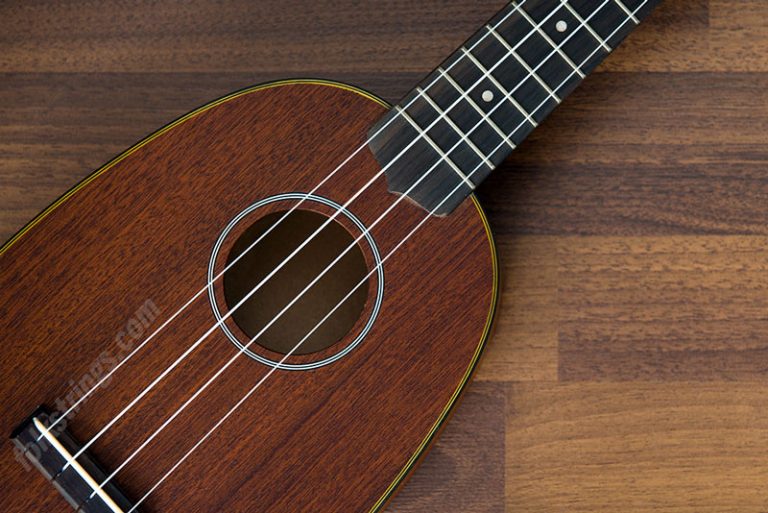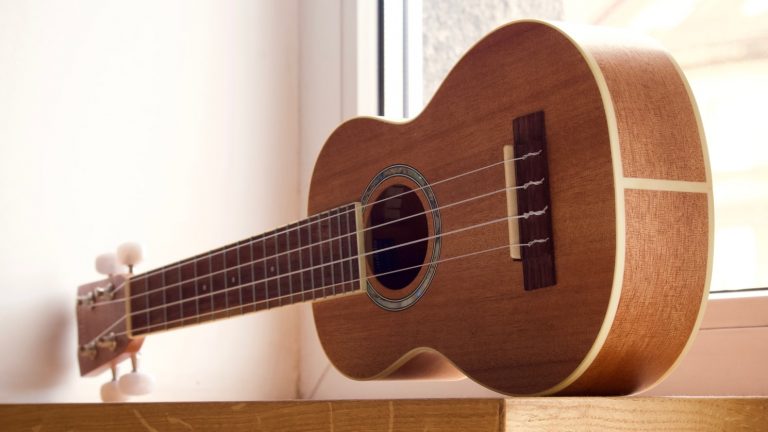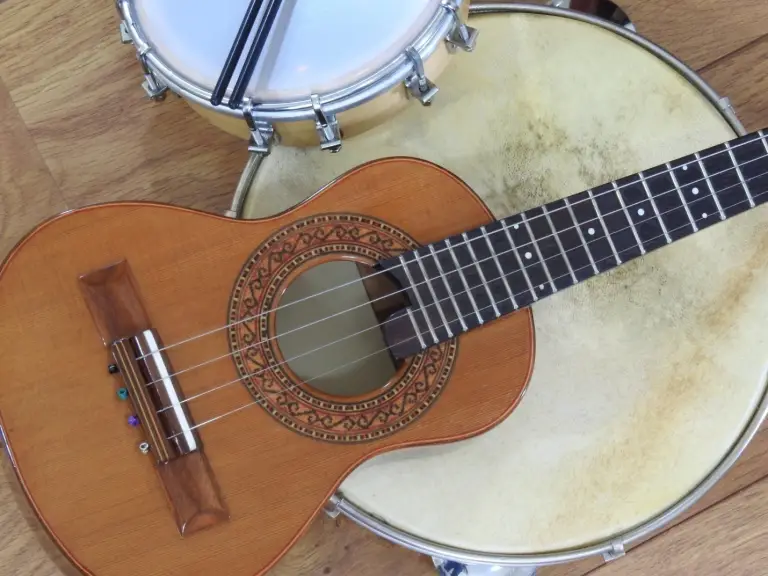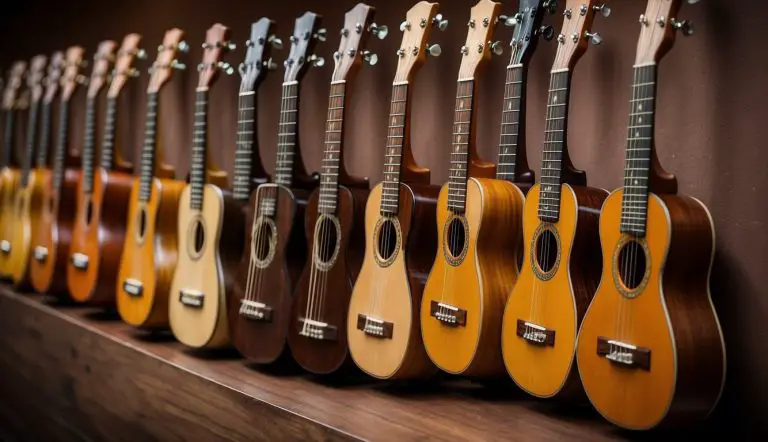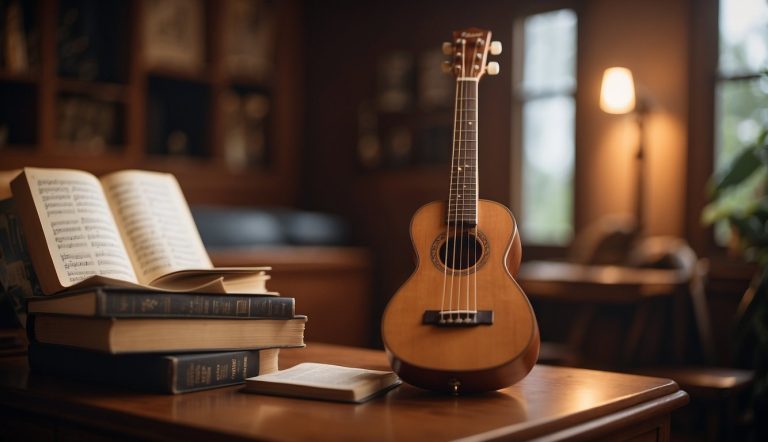What Are Some Good Ukulele Brands? – Top Picks for Uke Enthusiasts
Folkstrings.com is reader-supported. When you buy through links on our site, we may earn a small commission.
When I first started playing the ukulele, I quickly realized that the brand of the instrument can have a significant impact on the playing experience.
Over the years, I’ve found that some of the best ukulele brands cater not only to my changing skill levels but also to my preference for sound quality and build.
From handcrafted models that resonated with warm, rich tones, to more budget-friendly options that didn’t sacrifice quality for cost, discovering the right brand can be a rewarding part of the ukulele journey.
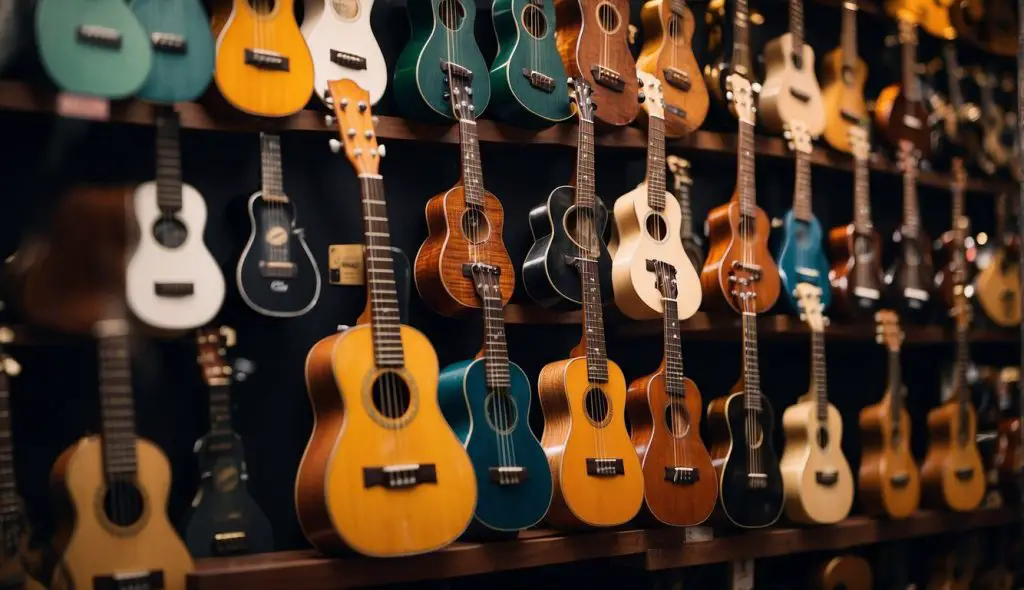
As I explored different ukuleles, I learned that sizes like soprano, concert, tenor, and baritone each offer distinct sounds and playability.
Top brands pay meticulous attention to the materials and construction of their instruments, which can significantly affect their durability and sound.
Before choosing a ukulele, I always consider what my needs are, including the type of music I want to play, the sound quality I prefer, and the level of investment I’m ready to make. This holistic approach to selecting a ukulele ensures that the instrument I choose will not only meet but often exceed my expectations.
Key Points
- Different ukulele brands cater to various skill levels and preferences.
- Understanding ukulele types and materials is crucial for finding a quality instrument.
- Considering personal needs before purchasing can greatly enhance satisfaction.
Table of Contents
Top Ukulele Brands for Different Skill Levels
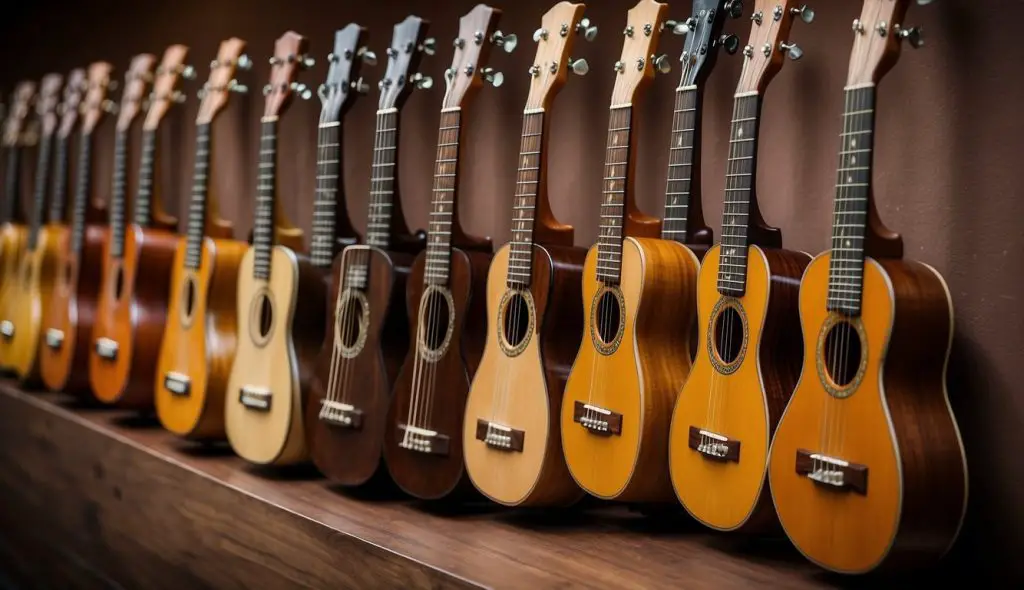
When I’m on the lookout for a new ukulele, I always consider skill level and brand reputation. Here’s a breakdown of some of the top picks across different expertise levels.
Best Ukulele Brands for Beginners
For those just starting out, ease of play and affordability are key.
- Kala: Kala is renowned for its quality beginner instruments that offer excellent value.
- Mahalo: With Mahalo ukuleles, beginners can enjoy a colorful selection that’s fun to play and gentle on the wallet.
Popular Brands for Intermediate Players
Intermediate players usually look for something that brings a richer sound and more playability without breaking the bank.
- Lanikai: Lanikai creates ukuleles with a warmer tone, suited for those looking to step up their playing.
- Luna: Luna ukuleles often feature artistic designs and provide a good balance between quality and price.
Premium Options for Professionals
Professionals seek exceptional craftsmanship and sound quality in their ukuleles, often turning to brands with historic prestige.
- Martin: Martin offers superbly crafted ukuleles with rich, full-bodied tones that many pros appreciate.
- Kamaka: As one of Hawaii’s original ukulele makers, Kamaka is synonymous with professional-grade instruments boasting traditional Hawaiian sound.
Understanding Ukulele Types and Sizes
When picking out a ukulele, the size and type directly influence the instrument’s tone and playability. Let’s explore the four main sizes: soprano, concert, tenor, and baritone.
Soprano Ukulele
The soprano ukulele is the smallest and most traditional size, delivering a classic, bright, and jangly sound associated with Hawaiian music. I find its compact size, typically around 20 inches in length, ideal for young players or individuals with smaller hands.
Concert Ukulele
A concert ukulele is a tad larger at around 23 inches, giving it a richer sound and slightly more volume than its soprano counterpart. It offers a comfortable balance between the soprano’s ease of handling and the larger ukulele’s fuller tones.
Tenor Ukulele
The tenor ukulele stretches to about 26 inches, granting even more space for finger placement and a deeper, mellower tone. It’s perfect for players like me who prefer a larger fretboard and a sound that cuts through mixtures of different instruments.
Baritone Ukulele
Finally, the baritone ukulele stands out at roughly 30 inches, with the deepest tone of them all. It’s tuned differently from the other three types, closer to the sound of a guitar, and provides a rich fullness that can be compared to a small classical guitar.
Each ukulele type brings a unique sound and feel, catering to various preferences and styles. Whether it’s the classic soprano or the deep baritone, there’s a ukulele size to match the music you’re drawn to play.
Materials and Build Quality to Look Out For
When picking out a ukulele, the materials used and the instrument’s construction are pivotal for both sound and durability.
Tonewoods
I like to think of tonewoods as the soul of a ukulele. Different woods impart unique tonal characteristics, and two of the most beloved are mahogany and koa wood.
- Mahogany: Known for its warm, rich tone, mahogany is a common choice for both the body and neck of ukuleles. It typically offers a well-rounded sound with an emphasis on midrange frequencies.
- Koa Wood: Originating from Hawaii, koa is highly sought after for its bright, clear sound and beautiful grain patterns. Koa ukuleles often produce a rich, resonant tone that matures over time, making them a preferred material for high-quality instruments.
Construction Features
The construction elements of a ukulele contribute significantly to its playability and sound quality.
Solid Wood vs. Laminate: I’ve noticed that ukuleles made from solid wood pieces tend to have superior sound resonance compared to laminate counterparts. While laminate is more affordable and resistant to humidity changes, solid wood ukuleles offer a tonal depth that’s hard to match.
Construction Quality: The way a ukulele is built affects its overall integrity. I always examine the seams and joints for tightness and ensure there’s no excess glue — signs that the ukulele was made with attention to detail.
- Design Features: Some design elements to look out for include a well-crafted nut and saddle, which should be made from quality materials as they influence the instrument’s intonation and sustain. The finish should be even and smooth, without impacting the wood’s resonance.
Things to Think About BEFORE Buying a Ukulele
When I’m considering a new ukulele, there are a few aspects I always contemplate. I want to ensure that my investment aligns with my musical ambitions, the necessities for playing different styles, and the accessories that might be needed for the best playing experience.
Ukulele for Various Music Styles
Whether I’m plucking out a melody for a pop song or strumming chords for a rock anthem, the design of the ukulele greatly influences its sound. I think about what music I’ll be playing:
- Pop: A concert or tenor ukulele typically offers versatility.
- Rock/Jazz: I prefer a ukulele with a cutaway design for easier access to higher frets.
- Party: A soprano ukulele with bright tones is easy to carry and great for social gatherings.
I also ensure the ukulele strings are of high quality, like Aquila Nylgut strings, which are well respected in the industry.
Accessories and Add-ons
My ukulele is not just about the instrument itself. Accessories can make a significant difference. Here’s a list I consider:
- Gig Bag: Crucial for protecting my ukulele when I’m on the move.
- Amp/Preamp: Necessary for performing in larger spaces; I look for ukuleles with built-in electronics.
- Extra Strings: Always handy to have, in case of a mid-performance snap.
Budget and Pricing
Staying within my budget is critical, and thankfully, there are options across all price ranges. Here’s how I approach this:
- Quality Ukuleles: Well-known brands like Cordoba, particularly the 15CM model, offer great craftsmanship without breaking the bank.
- Affordable Options: Sometimes I look for cheaper ukuleles, but I’m careful to check reviews to ensure they don’t compromise on sound.
- Investment: If I’m planning to play often, I see a higher priced ukulele as a long-term investment in my music.
Conclusion
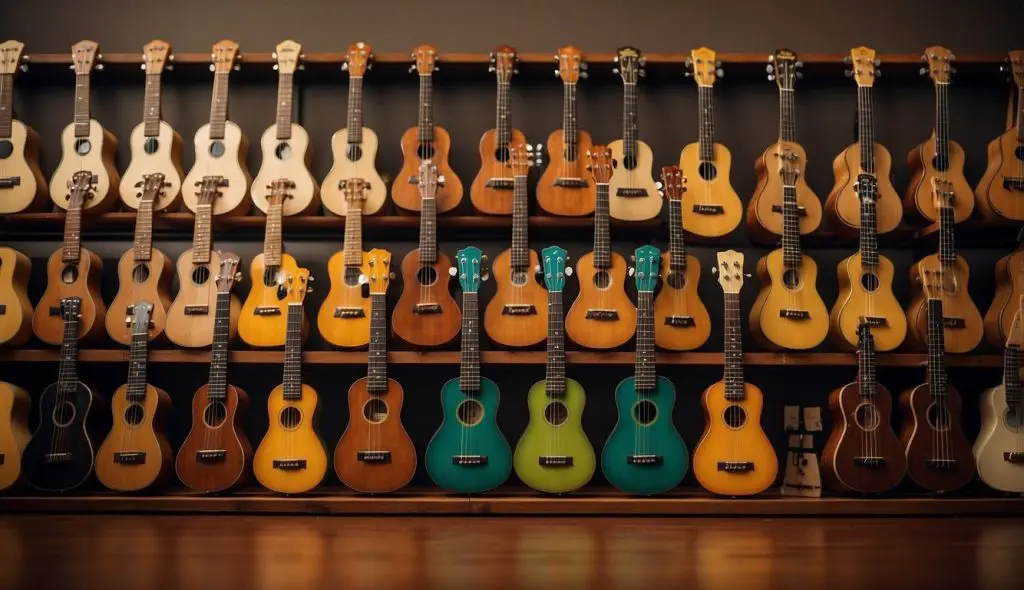
In my exploration of ukulele brands, I’ve been impressed with the quality craftsmanship that goes into creating these charming instruments. The best ukulele brands, to my ear, produce a sound that’s both warm and sweet, which is essential for that classic uke allure we all love. Brands like Kamaka, KoAloha, and Kanile’a have not only great reputations but also consistently deliver on sound.
I’ve found that a uke’s quality isn’t just about the price tag; it’s the attention to detail and the love that goes into building each piece.
For those venturing into the fun world of u-bass, brands like Kala are at the forefront, offering a unique twist on the traditional ukulele experience. Here’s a snapshot of brands that I believe stand out in the ukulele world:
| Brand | Quality | Sound Signature | Notable Product |
|---|---|---|---|
| Kamaka | High | Warm, resonant | HF-3 Tenor Ukulele |
| KoAloha | High | Bright, sweet | KTM-00 Tenor Ukulele |
| Kanile’a | High | Rich, full | K-1 Tenor Ukulele |
| Kala | Varied | Broad range, accessible | UBASS-EM-FS |
Remember, my final word on the subject is this: the best ukulele is the one that feels right in your hands and brings joy to your music. Whether you’re serenading friends or rocking a solo on a u-bass, the right ukulele can make all the difference. Happy strumming!
The Legacy and Evolution of Ukulele Brands
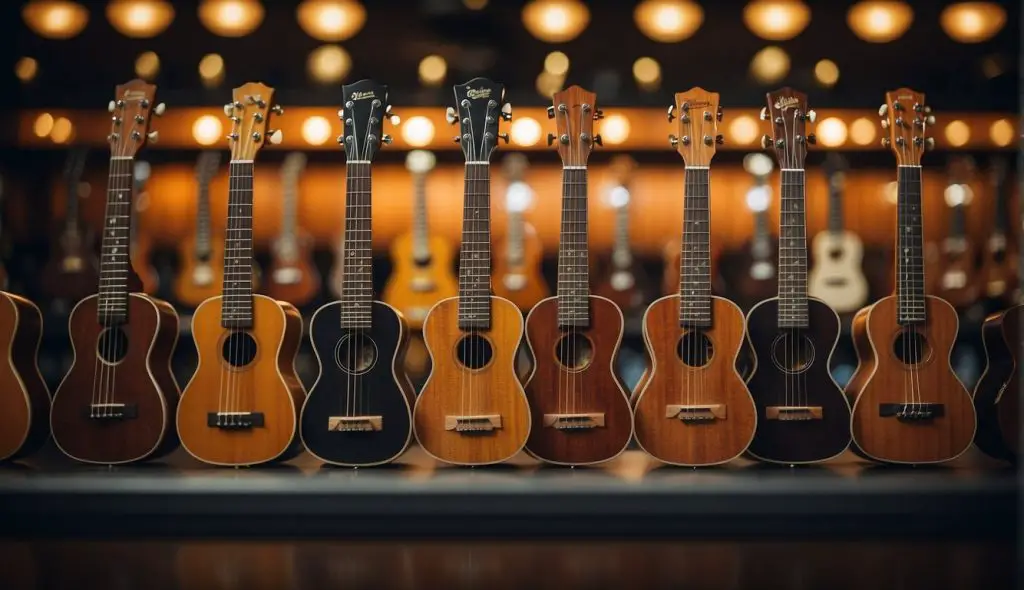
In the rich tapestry of musical instruments, the ukulele stands out for its accessibility and charm, with brands like Kamaka and Martin being synonymous with quality and tradition. As I unravel the story of these brands, I’ll also explore the innovations that have continued to make the ukulele a beloved string instrument worldwide.
Historical Background of Brands
The journey of ukulele brands begins in Hawaii, where Portuguese immigrants introduced small guitar-like instruments in the 19th century. Kamaka, for example, is a pioneering brand established in 1916 and is known for its handcrafted ukuleles that have become collectible items.
Another classical brand, Martin, initially a guitar brand, ventured into ukulele production in the 20th century and became one of the most revered names in the industry.
| Brand | Founded | Notable Contributions |
|---|---|---|
| Kamaka | 1916 | Handcrafted, high-quality ukuleles |
| Martin | 1833† | Expansion from guitars to ukuleles |
† Martin was founded in 1833 but later expanded into ukulele manufacturing.
Other noteworthy manufacturers include Kala, which offers a range of ukuleles that suit beginners and professionals alike, and Lanikai, whose instruments cater to both traditional ukulele enthusiasts and contemporary musicians.
Ohana, a brand known for its consistent quality and affordability, also contributes to the rich history of ukulele manufacturing.
Innovations in Ukulele Manufacturing
Innovation in ukulele manufacturing has kept this musical instrument relevant and popular. For example, KoAloha and Ko’olau stand out for their high-quality craftsmanship and use of native Hawaiian woods.
Meanwhile, Oscar Schmidt by Washburn delivers affordability without compromising on quality, often providing a warranty as a testament to the confidence in their instruments.
Brands like Luna Ukulele, Lohanu Ukulele, and Donner have made a splash on platforms like Amazon due to their unique designs and value for money, often becoming popular choices for new players.
Furthermore, companies like Hohner and Yvonne de Villiers’ Luna Guitars exemplify innovation by creating ukuleles with distinctive aesthetics that appeal to a broad audience.
With the evolution of these brands, musicians can select from a spectrum of ukuleles that reflect both golden-age craftsmanship and modern musical innovation, ensuring the instrument’s popularity endures.
Frequently Asked Questions
In my experience as a ukulele enthusiast, I’ve come across a range of brands that cater to different skill levels and budgetary requirements.
I’ll address some of the most common queries to help guide you through the process of choosing the right ukulele brand for your needs.
What are the top choices for beginner ukulele players?
For beginners, I recommend brands like Kala, Makala, and Mahalo. These brands are known for producing reliable instruments that are perfect for getting started without breaking the bank.
Which ukulele brands offer the best value for money?
If you’re looking for the best bang for your buck, check out brands such as Cordoba and Lanikai. These manufacturers provide a great blend of quality craftsmanship and affordability.
Can you list some professional-grade ukulele manufacturers?
Professional players often gravitate towards brands like Kamaka, KoAloha, and Kanile’a. These Hawaiian-based companies are revered for their high-quality woods and impeccable construction.
What are suitable ukulele options for children?
For children, ukuleles by Hola! and Kala’s Waterman series are excellent options. They are durable, easy to play, and come in a variety of fun colors.
How much should I expect to spend on a high-quality ukulele?
A high-quality ukulele can cost anywhere from $100 to several thousand dollars. Brands like Kamaka and Martin sit at the higher end of the spectrum, reflecting the craftsmanship and materials used.
Are there certain ukulele brands I should consider avoiding?
While I prefer not to disparage any brands, I advise you to be cautious of extremely low-priced ukuleles from no-name brands, as they can often be poorly made and hinder the learning process.
Author Profile
-
Daniel Johnstone is an English writer with a love for stringed instruments from around the world.
He shares his love for these instruments through his writing for folkstrings.com, a website dedicated to all things related to folk string music.
Daniel's passion for music started at a young age, and he has since become an accomplished musician, playing guitar, cavaco, and recently, the harp.
His dedication to learning and sharing his knowledge of stringed instruments is evident in his insightful and engaging blog posts. Whether you're a seasoned musician or a beginner, Daniel's writing is sure to inspire and entertain you.
When he's not playing music or writing, you can find Daniel exploring new instruments and seeking out new sounds to share with his readers.
Latest entries
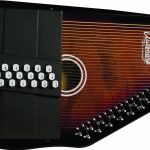 AutoharpApril 4, 2024What Is the Autoharp Made Of: Exploring Its Materials and Craftsmanship
AutoharpApril 4, 2024What Is the Autoharp Made Of: Exploring Its Materials and Craftsmanship AutoharpApril 4, 2024Is Autoharp Easy to Play? Unveiling the Truth for Beginners
AutoharpApril 4, 2024Is Autoharp Easy to Play? Unveiling the Truth for Beginners AutoharpApril 4, 2024What Is an Autoharp Worth? Your Guide to Pricing and Value
AutoharpApril 4, 2024What Is an Autoharp Worth? Your Guide to Pricing and Value AutoharpApril 4, 2024Are Autoharp and Zither the Same Thing? Unraveling String Instrument Myths
AutoharpApril 4, 2024Are Autoharp and Zither the Same Thing? Unraveling String Instrument Myths
Affiliates:
This post may contain affiliate links that at no additional cost to you, the site may earn a small commission. We only recommend products we would use ourselves and all opinions expressed on this site are our own.
Accuracy Advice:
While we strive to provide up-to-date and accurate information, the content in this article may not reflect the most current research or medical guidelines. We encourage readers to do further research and consult with professionals for more personalized advice.
Our Recommendations:
The products and services mentioned in any of our articles are recommended based on our independent research and personal experience. We are not sponsored by any company. We aim to suggest products and services we believe are of high quality and could be beneficial to our readers.


